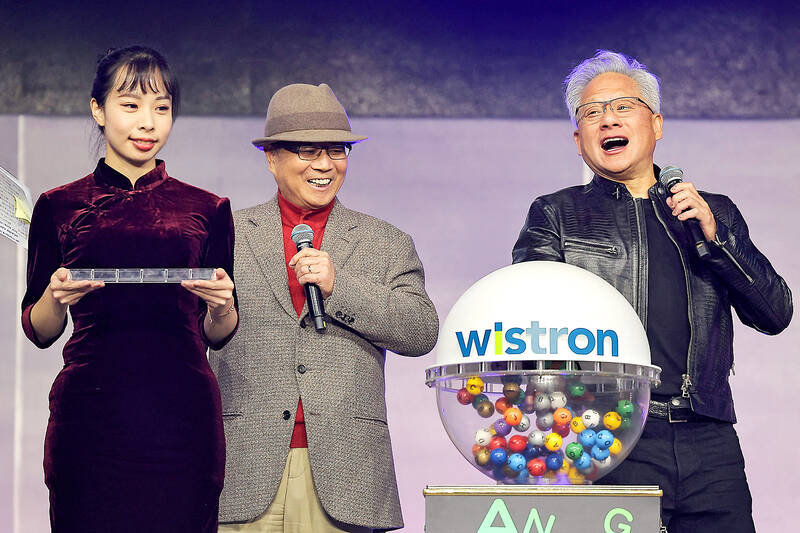Nvidia Corp CEO Jensen Huang (黃仁勳) is expected to miss the inauguration of US president-elect Donald Trump on Monday, bucking a trend among high-profile US technology leaders.
Huang is visiting East Asia this week, as he typically does around the time of the Lunar New Year, a person familiar with the situation said.
He has never previously attended a US presidential inauguration, said the person, who asked not to be identified, because the plans have not been announced.

Photo, Ann Wang, Reuters
That makes Nvidia an exception among the most valuable technology companies, most of which are sending cofounders or CEOs to the event. That includes Apple Inc CEO Tim Cook, Amazon.com Inc cofounder Jeff Bezos and Tesla Inc head Elon Musk, a close Trump ally.
A representative for Santa Clara, California-based Nvidia declined to comment whether there has been communication with the incoming administration.
Huang earlier this month said that he would be delighted to meet Trump and “do whatever we can to make this administration succeed.” However, he said he had not yet been invited to the president-elect’s home base at Mar-a-Lago in Florida.
Huang also said he expected Trump to bring less regulation.
“I think that’s a good thing,” he said. “As an industry, we want to move fast.”
Nvidia is facing a barrage of new rules and regulations in the final days of US President Joe Biden’s administration. The measures include steps to tighten access to advanced technology, such as Nvidia’s industry-leading artificial intelligence (AI) chips, to keep them out of China’s hands.
Nvidia has chafed at new export curbs unveiled this week, calling them an “overreach” and warning that they could be catastrophic for the tech industry.
“As the first Trump administration demonstrated, the US wins through innovation, competition and by sharing our technologies with the world — not by retreating behind a wall of government overreach,” Nvidia government affairs vice president Ned Finkle said earlier this week.
Nvidia and Huang have become the biggest stars of the chip world over the past two years. As the company’s sales have surged, Huang has crisscrossed the globe promoting AI technology, often in his signature leather jacket. Nvidia is the world’s most valuable chipmaker and only ranks behind Apple among all tech companies.
The chip industry would have a presence at the inauguration. Arm Holdings PLC CEO Rene Haas is one executive who plans to attend, a person familiar with Haas’ plans said.
Huang yesterday said that he had met Taiwan Semiconductor Manufacturing Co (台積電) chairman C.C. Wei (魏哲家) for lunch, during which they talked about ramping up production of Nvidia’s most advanced AI graphics processing units, Blackwell.
Additional reporting by Reuters

When Lika Megreladze was a child, life in her native western Georgian region of Guria revolved around tea. Her mother worked for decades as a scientist at the Soviet Union’s Institute of Tea and Subtropical Crops in the village of Anaseuli, Georgia, perfecting cultivation methods for a Georgian tea industry that supplied the bulk of the vast communist state’s brews. “When I was a child, this was only my mum’s workplace. Only later I realized that it was something big,” she said. Now, the institute lies abandoned. Yellowed papers are strewn around its decaying corridors, and a statue of Soviet founder Vladimir Lenin

UNIFYING OPPOSITION: Numerous companies have registered complaints over the potential levies, bringing together rival automakers in voicing their reservations US President Donald Trump is readying plans for industry-specific tariffs to kick in alongside his country-by-country duties in two weeks, ramping up his push to reshape the US’ standing in the global trading system by penalizing purchases from abroad. Administration officials could release details of Trump’s planned 50 percent duty on copper in the days before they are set to take effect on Friday next week, a person familiar with the matter said. That is the same date Trump’s “reciprocal” levies on products from more than 100 nations are slated to begin. Trump on Tuesday said that he is likely to impose tariffs

HELPING HAND: Approving the sale of H20s could give China the edge it needs to capture market share and become the global standard, a US representative said The US President Donald Trump administration’s decision allowing Nvidia Corp to resume shipments of its H20 artificial intelligence (AI) chips to China risks bolstering Beijing’s military capabilities and expanding its capacity to compete with the US, the head of the US House Select Committee on Strategic Competition Between the United States and the Chinese Communist Party said. “The H20, which is a cost-effective and powerful AI inference chip, far surpasses China’s indigenous capability and would therefore provide a substantial increase to China’s AI development,” committee chairman John Moolenaar, a Michigan Republican, said on Friday in a letter to US Secretary of

Taiwan Semiconductor Manufacturing Co’s (TSMC, 台積電) market value closed above US$1 trillion for the first time in Taipei last week, with a raised sales forecast driven by robust artificial intelligence (AI) demand. TSMC saw its Taiwanese shares climb to a record high on Friday, a near 50 percent rise from an April low. That has made it the first Asian stock worth more than US$1 trillion, since PetroChina Co (中國石油天然氣) briefly reached the milestone in 2007. As investors turned calm after their aggressive buying on Friday, amid optimism over the chipmaker’s business outlook, TSMC lost 0.43 percent to close at NT$1,150